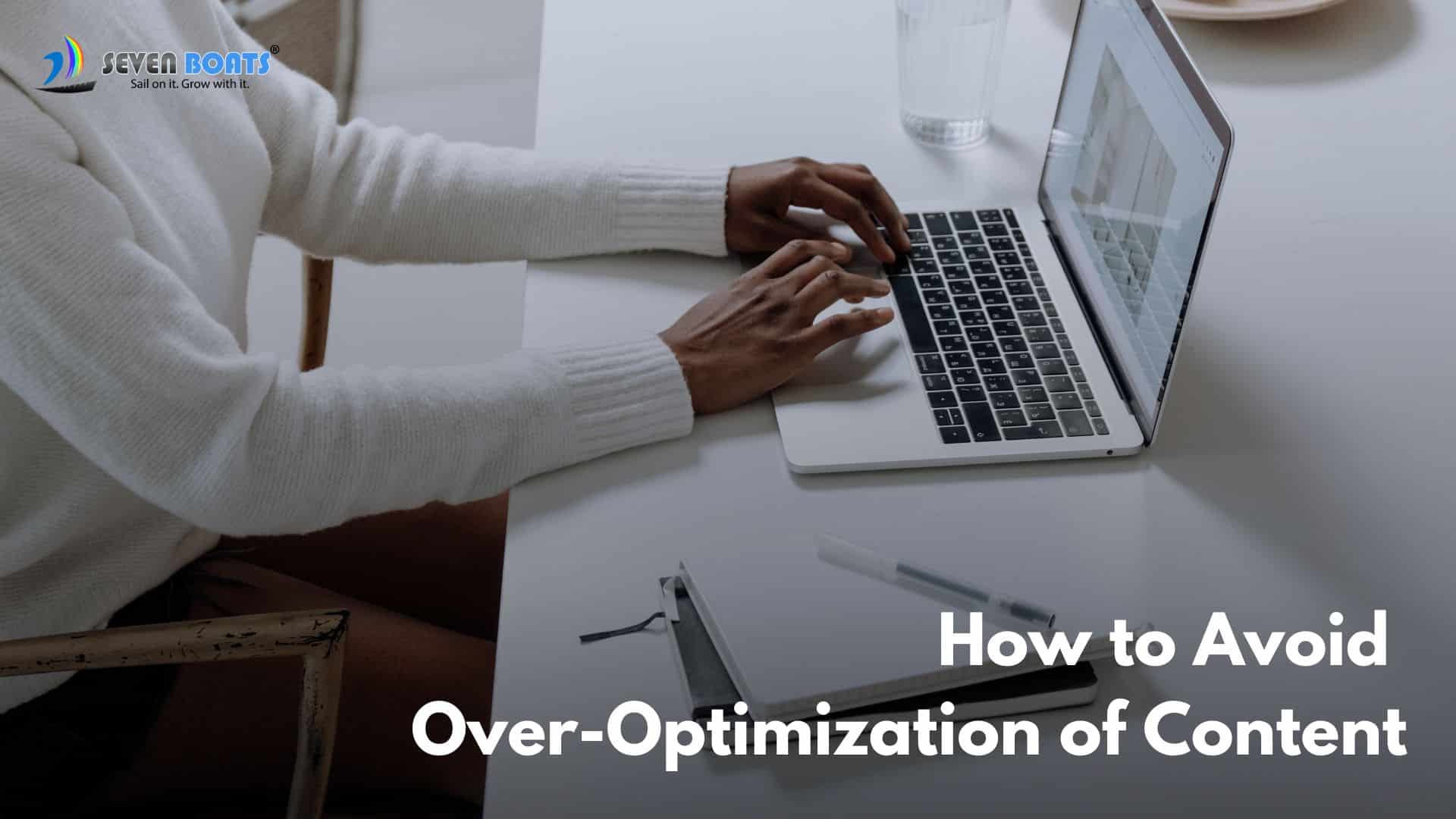Content optimization is essential for ranking well in search engines, but sometimes, we go too far, which leads to over-optimization. Over-optimization can hurt your rankings and drive potential customers away because the content feels forced or unnatural. So, how can you avoid this pitfall?
Let’s dive into how to avoid over-optimization of content in a way that feels fresh, natural, and relatable.
What is Over-Optimization?
Over-optimization happens when a website or content is overly tuned for SEO (Search Engine Optimization) in a way that negatively affects its quality or user experience. It’s like trying too hard to impress search engines with keywords, links, and technical tweaks, but in the process, you forget the actual readers.
It involves tactics like:
- Keyword stuffing (using too many keywords unnaturally)
- Overloading your pages with internal links
- Using too many exact-match anchor texts
- Writing content that feels forced and robotic to satisfy algorithms
In simple terms, it’s when optimization starts harming rather than helping. The content ends up being awkward, repetitive, or even annoying to your readers.
Why is Over-Optimization a Problem?
Over-optimization can seriously backfire, even though the intention is good (to rank better). Here’s why it’s a problem:
- Search engines may penalize your site: Google’s algorithms are smart enough to recognize when content is over-optimized. They can demote your site or even remove it from search results.
- It damages user experience: If your content feels unnatural or keyword-heavy, it can drive readers away. They might not even finish reading your article if it feels too ‘robotic’ or repetitive.
- Lower engagement rates: Content that is over-optimized may result in fewer shares, comments, or conversions because it lacks authenticity.
So, the aim should always be to balance SEO best practices with natural, reader-friendly content.
How to Recognize Over-Optimization?
Before you can fix over-optimization, you need to recognize the signs. But how do you know when your content is going overboard?
Here are a few red flags to watch for:
- High keyword density: If you’re repeating the same keywords over and over again to hit some arbitrary SEO “magic number,” it’s time to stop.
- Stilted, awkward sentences: Are you writing sentences that feel unnatural just to squeeze in keywords? Your readers will notice.
- Overloaded anchor texts: Are you linking every keyword in sight? If every link is an exact match to the target keyword, that’s a big over-optimization signal.
- Page speed and user interaction: Too much technical optimization can slow down your site, which harms user experience.
What Are the Best Practices to Avoid Over-Optimization?
To avoid over-optimizing your content, follow these simple best practices that help maintain balance between SEO and great user experience:
1. Write for Humans, Not Robots
First and foremost, always write content that appeals to your audience rather than algorithms. Keywords are important, but they should fit naturally into your content. Prioritize clarity, flow, and relevance.
2. Use Keywords Naturally
Use keywords in a way that makes sense. Instead of awkwardly forcing them in, write your content naturally and insert keywords where they fit. Google and other search engines now focus more on context and user intent, so use keywords in a way that supports the natural message of your content.
3. Limit Exact-Match Anchor Texts
Too many exact-match keywords in your internal links can trigger over-optimization penalties. Try using variations of anchor text or even longer phrases to avoid repetition.
For example:
- Instead of always using “best running shoes,” mix it up with “great footwear options for running.”
4. Focus on User Experience (UX)
Content optimization doesn’t stop at keywords. Consider how your audience interacts with your website. Are they able to find the information they need? Does your content load quickly? Is it easy to read and navigate?
These factors matter a lot for both users and search engines. A smooth, enjoyable experience will naturally boost your SEO.
When Should You Focus on User Intent?
User intent is the main goal of content optimization these days. Search engines are more concerned about whether your content satisfies what users are looking for. So, when should you focus on user intent rather than keyword optimization?
The answer is simple: always.
Before you start writing, ask yourself:
- What does my audience want to know?
- What problem am I solving for them?
- How can I make this content useful, engaging, and easy to understand?
When you focus on user intent, you’re less likely to fall into the trap of over-optimization because your content becomes more about helping readers and less about trying to game the system.
Which Tools Can Help Prevent Over-Optimization?
A few SEO tools can help you optimize without going overboard. Here are some of the best ones:
- Yoast SEO: A popular plugin that guides you through on-page optimization while reminding you to keep things balanced.
- Google Search Console: Use this to monitor your site’s performance, and see if your content is showing any over-optimization issues.
- Grammarly: It helps with clarity, tone, and overall readability, ensuring your content feels natural.
- SurferSEO: This tool offers optimization suggestions based on content from top-ranking pages, but you can choose to apply them in a reader-friendly way.
These tools help you spot areas where you’re going too far with optimization and offer suggestions for improvement.
Where Should You Draw the Line Between Optimization and Over-Optimization?
The key to avoiding over-optimization lies in striking the right balance. You need to draw the line between optimizing for search engines and creating valuable content for your audience.
Here’s how you can find that balance:
- Don’t obsess over keyword counts: Instead of stuffing your content with keywords, focus on naturally including them where it makes sense. If you’re finding it hard to fit a keyword, that’s a sign you’re trying too hard.
- Mix up your anchor texts: Not every internal link needs to be an exact-match keyword. Vary your anchor text to make your content feel more natural.
- Consider your readers first: If a sentence sounds awkward, change it—even if it means losing a keyword. Your readers will appreciate the clarity and flow.
Why Should You Keep an Eye on Google’s Updates?
Search engines are constantly evolving, and so are their algorithms. What worked for SEO a few years ago might not work today.
Stay updated on Google’s algorithm changes to ensure you’re not falling into over-optimization traps. Google frequently updates its guidelines on keyword usage, content quality, and user experience, so keeping an eye on these will help you adjust your strategies.
How Can You Measure Success Without Over-Optimization?
Success in SEO isn’t just about ranking well—it’s about providing value to your audience. To measure your content’s success without over-optimization, keep an eye on these metrics:
- Bounce rate: If people are leaving your page quickly, that might mean your content isn’t user-friendly.
- Engagement: How often are people commenting, sharing, or linking to your content? High engagement usually means your content is resonating well with your audience.
- Conversion rate: Are readers taking the desired action (like signing up for a newsletter or making a purchase)? This is the ultimate sign that your content is working.
Conclusion
Avoiding over-optimization isn’t about doing less optimization; it’s about doing it smarter. By focusing on user intent, writing naturally, and using keywords and links in a balanced way, you can create content that ranks well without turning off your audience. Stay updated on search engine guidelines and always prioritize your readers’ experience over SEO tactics.
In the end, the best content doesn’t just rank high—it connects with the people reading it.








To avoid over-optimization, focus on writing content naturally for readers, not just for search engines. Avoid keyword stuffing, unnatural anchor texts, and overuse of links. Prioritize user experience, maintain readability, and ensure that the content delivers value. Regularly update your strategy based on SEO tools and Google’s guidelines
Wow! This article truly stands out as a valuable resource. I must commend you for the depth of insight and the clarity with which you’ve presented such intricate concepts. It’s not often that one comes across content that is both informative and engaging, keeping readers hooked from start to finish.
I particularly appreciate how you’ve broken down the complexities into digestible pieces, making it accessible even for those who might be new to this subject. Your ability to bridge the gap between expert knowledge and readability is truly commendable. It’s clear you’ve poured a great deal of effort and research into this post, and it shows in every sentence.
Your writing not only educates but also inspires readers like me to delve deeper into the topic. Please keep up the excellent work, as your contributions are undoubtedly making a difference in the digital space.
As someone who shares a passion for content creation and digital growth, I believe we could benefit from exchanging ideas. I would love for you to visit my blog, Marketing Partner Marketing Partner, where I explore strategies to help people grow their online businesses and connect with potential customers. Your thoughts on my work would mean a lot to me, and perhaps we could even collaborate in the future!
Looking forward to more incredible content from you! Keep shining and inspiring.
Warm regards,
Biswajit Barman
Digital Marketing Partner, India
“From SEO to social media, discover actionable tips to grow your brand’s visibility and drive meaningful results! “
Some really useful tips on what NOT to do while optimizing a website! Achieving these two objectives is very important especially when one needs to balance between production of quality content and contents that are friendly to search engines. This requires that you should develop quality, absorbing content that will benefit the target market rather than mass loading keywords. Simplicity, clearness, and convenience oriented at the actual user should always be on top. In other words, true engagement may sometimes be much more effective than conformity to best practices. Good job on explaining this important segment of creating content!
Over-optimization can easily backfire and lead to penalties, so focusing on creating natural, user-friendly content is key. Also, being consistent. :)
Great article on avoiding over-optimization! It’s crucial to balance SEO techniques with user experience, and I love how you emphasized writing for humans first. The tips on using keywords naturally and focusing on user intent really resonate. Over-optimization can make content feel forced and turn readers off, so the advice to prioritize readability and clarity is spot on. The examples of tools like Yoast SEO and Grammarly are also helpful for maintaining that balance. Thanks for sharing these valuable insights!